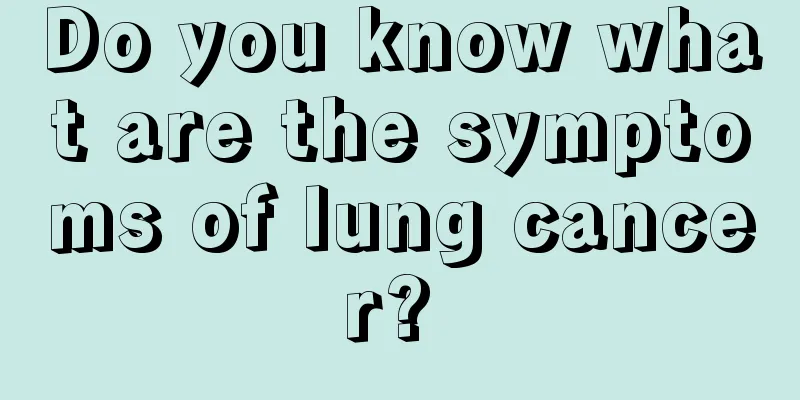What should I do if my esophagus is blocked by esophageal cancer

|
Esophageal cancer brings not only the torture of illness but also a heavy economic burden to patients. In the later stage, the esophagus will be blocked by cancer cells. What should we do if the esophagus is blocked by esophageal cancer? If patients with esophageal cancer have such symptoms, we must find the specific cause of the symptoms of esophageal cancer. Only in this way can we better understand the specific causes of the symptoms of esophageal cancer and take appropriate treatment measures according to the patient's condition. Then let us take a look at the symptoms of esophageal cancer together. 1. Early symptoms of esophageal cancer Clinically, symptoms are often not obvious, and are mostly caused by local lesions stimulating abnormal esophageal motility or spasm, or by local inflammation, erosion, superficial ulcers, and tumor infiltration. They often recur, and the intervals may be asymptomatic and may last for several years. The main characteristic symptoms are discomfort behind the sternum or pain when swallowing. The pain is burning, stabbing, or pulling and rubbing, especially when eating rough, overheated, or irritating food. Food passes slowly with a slight choking sensation, and most cases progress slowly. Other rare symptoms include stuffiness behind the sternum, dryness and tightness in the throat, etc. 3% to 8% of cases may not feel anything. 2. Symptoms of mid-stage esophageal cancer The typical symptom is progressive dysphagia. Because the esophageal wall has good elasticity and expansion ability, the dysphagia symptom is not obvious when the cancer has not involved more than half of the circumference of the esophagus. The degree of dysphagia is related to the pathological type. The constrictive and medullary types are more severe than other types. About 10% of cases have symptoms or initial symptoms other than dysphagia, accounting for 20% to 40%, which causes delayed diagnosis of esophageal cancer. Some patients experience pain behind the sternum or between the shoulder blades when swallowing food. The location of the tumor indicates that there has been external invasion, causing esophagitis, mediastinitis, or deep esophageal ulcers. Pain caused by lower thoracic tumors can occur under the xiphoid process or in the upper abdomen. If there is persistent chest and back pain, it is mostly caused by cancer invasion and/or compression of the pleura and spinal nerves. Esophageal cancer itself and inflammation can reflexively cause increased secretion of esophageal glands and salivary glands, which can cause choking and pneumonia through reverse peristalsis of the esophagus. Symptoms of advanced esophageal cancer It is usually caused by compression and complications, and lymphatic and hematogenous metastasis may occur. If there is ulceration, inflammation or tumor invasion in the esophageal lesion, persistent dull pain behind the sternum or in the back will occur. If the pain is severe and accompanied by fever, you should be alert to whether the tumor has perforated or is about to perforate. Lymph node metastasis of cancer is often behind the attachment of the sternocleidomastoid muscle above the clavicle, more on the left side than on the right side. If the recurrent laryngeal nerve is compressed, hoarseness will occur; if the cervical sympathetic nerve is compressed, Horner syndrome will occur. Laryngitis caused by inhalation inflammation can also cause hoarseness, and indirect laryngoscopy can help to identify it. Cancer compression of the trachea can cause coughing and dyspnea. Sometimes, due to severe esophageal obstruction, reverse peristalsis occurs, causing esophageal contents to be accidentally inhaled into the airway, causing infection. Cancerous tissues infiltrate the mediastinum, trachea, bronchus, and aorta, causing mediastinitis, tracheoesophageal fistula, pneumonia, lung abscess, and even fatal hemorrhage. Patients may suffer from malnutrition, dehydration, and cachexia due to dysphagia. If the patient has metastasis to important organs such as bones, liver, and brain, he or she may develop symptoms such as bone pain, jaundice, ascites, and coma. The above is a description of the symptoms of esophageal cancer at different stages. I believe that after reading it, you will have a clearer understanding of the development of esophageal cancer. We must find the specific cause of esophageal blockage in esophageal cancer patients so that we can find specific treatment methods suitable for patients. Therefore, when faced with this situation, we must remind patients to go to the hospital for examination and medical treatment in time. |
<<: What are the traditional Chinese medicine formulas for esophageal cancer
>>: What are the folk remedies for curing esophageal cancer?
Recommend
What are baby pull-ups?
Many young people may not know what baby pull-up ...
What are the small bumps in the groin
Our body is a complete and independent individual...
What are the examination methods for kidney cancer
Kidney cancer, also known as renal cell carcinoma...
How to make delicious chicken soup
Drinking soup is a habit of many people. Nowadays...
Prognostic analysis of early cervical cancer
In daily life, cervical cancer is the most common...
What are the medicinal properties of Linggao
Guiling jelly is something that can moisten the t...
What kind of harm will bile duct cancer cause to patients
"The King of Cancer" is a name that mak...
What should I do if I can't concentrate on studying? I'm so upset
If you feel frustrated because you can't conc...
How to check lung cancer? Several effective methods to confirm lung cancer
In recent years, due to poor air quality and othe...
What's wrong with the dandruff on my upper eyelids?
Dryness is the enemy of the skin. Dry skin is pro...
Analysis of the current status of glioma treatment methods
What is glioma? Perhaps many people are not very ...
What is heterophoria
If you feel that the other person cannot look you...
Recurrence rate of melanoma in situ
Melanoma is a tumor that develops from the malign...
How long does it usually take to recover from nasopharyngeal cancer
The recovery time of rhinitis is very long. Gener...
What is the cause of the abscess on the top of the head
In many cases, acne and pustules are prone to app...









